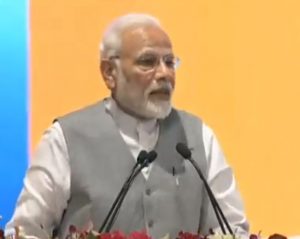
The ‘Make in India’ effort of Indian Railways has culminated into India’s first Semi High-Speed Train, “Vande Bharat Express”.
Prime Minister Narendra Modi will flag off the maiden run of the train on Friday from the New Delhi Railway Station. He will inspect the facilities on the train and address a gathering on this occasion.
Union Minister of Railways and Coal, Piyush Goyal will lead the team of officials and media persons aboard the train on its inaugural run.
It will stop at Kanpur and Prayagraj where it will be received by dignitaries and the people.
Vande Bharat Express can run up to a maximum speed of 160 kmph and has travel classes like Shatabdi Train but with better facilities. It aims to provide a totally new travel experience to passengers.
The Train will cover the distance between New Delhi and Varanasi in 8 hours and will run on all days except Mondays and Thursdays.
All coaches are equipped with automatic doors, GPS based audio-visual passenger information system, onboard hotspot Wi-Fi for entertainment purposes, and very comfortable seating. All toilets are bio-vacuum type. The lighting is dual mode, viz. diffused for general illumination and personal for every seat. Every coach has a pantry with a facility to serve hot meals, hot and cold beverages. The insulation is meant to keep heat and noise to very low levels for additional passenger comfort.
Vande Bharat Express has 16 air-conditioned coaches of which 2 are executive class coaches. The total seating capacity is 1,128 passengers.
Speed, Safety and Service are the hallmarks of this train. Integral Coach Factory (ICF), Chennai, a Railways Production unit, has been the force behind a completely in-house design and manufacture, computer modelling and working with a large number of suppliers for system integration in just 18 months.
In keeping with the vision of Prime Minister’s vision of “Make in India”, the major systems of the train have been designed and built in India. Impact of this train, matching global standards of performance, safety and passenger comfort and yet costing less than half of global prices, has the potential to be a game changer in the global rail business.













